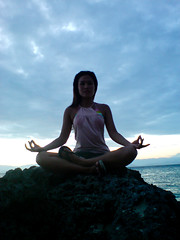
This week: Yoga!
Nowadays, the ability to deal with the diversity is ever growing. We actually live in a global world and we daily face the “different”. That’s why intercultural competencies and language proficiencies are very important. We are often afraid of the unknown and we don’t know how to behave and how to create a relationship with something that is new to us. Therefore, the development of competences in another culture and proficiency in its language becomes essential in our society in order to live without being frightened of the others, to enrich ourselves with new values and broaden our knowledge. Moreover, intercultural competences provide the opportunity for powerful reflections on our own native world view. In fact, as the Chinese philosopher Chung Tzu says: “looking in is looking out”. The ICC, intercultural communicative competence, is in fact a life-long process which enables us to understand better ourselves as subjects living in net of relationships.
One of the tools we can use to measure our ICC is the Yoga form. The term “YOGA” stands for “your Objectives, Guidelines, and Assessment” and it is divided into5 sections which are awareness, attitudes, skills, knowledge and proficiency, obviously in the host tongue.
This kind of test can be used as a self evaluating guide, useful to examine the development of our ICC.
As far as I am concerned, I filled in the form thinking about Spanish, which is the language I have studied better in my life, thanks to the Erasmus project. Actually, I only considered the first two levels of each sections (Educational Traveller and Sojourner) because I still haven’t got any professional or serious working experience.
I have never heard about this kind of Yoga before, this is one of the great amount of new tools discovered during this English course with Sarah; although we already had others occasions to reflect about our competences like for example with the PLE map, I think that this is a less free way to do it; actually, there are “strict” assessment to rate from 0 to 5, and this is surely a very objective way to assess. However, there is something new, a very interesting suggestion: “After doing so, it is useful to have a native of the host culture rate you as well”…This would be great! In this way we could have an idea of our ICC degree from an other point of view!
C U!
Nowadays, the ability to deal with the diversity is ever growing. We actually live in a global world and we daily face the “different”. That’s why intercultural competencies and language proficiencies are very important. We are often afraid of the unknown and we don’t know how to behave and how to create a relationship with something that is new to us. Therefore, the development of competences in another culture and proficiency in its language becomes essential in our society in order to live without being frightened of the others, to enrich ourselves with new values and broaden our knowledge. Moreover, intercultural competences provide the opportunity for powerful reflections on our own native world view. In fact, as the Chinese philosopher Chung Tzu says: “looking in is looking out”. The ICC, intercultural communicative competence, is in fact a life-long process which enables us to understand better ourselves as subjects living in net of relationships.
One of the tools we can use to measure our ICC is the Yoga form. The term “YOGA” stands for “your Objectives, Guidelines, and Assessment” and it is divided into5 sections which are awareness, attitudes, skills, knowledge and proficiency, obviously in the host tongue.
This kind of test can be used as a self evaluating guide, useful to examine the development of our ICC.
As far as I am concerned, I filled in the form thinking about Spanish, which is the language I have studied better in my life, thanks to the Erasmus project. Actually, I only considered the first two levels of each sections (Educational Traveller and Sojourner) because I still haven’t got any professional or serious working experience.
I have never heard about this kind of Yoga before, this is one of the great amount of new tools discovered during this English course with Sarah; although we already had others occasions to reflect about our competences like for example with the PLE map, I think that this is a less free way to do it; actually, there are “strict” assessment to rate from 0 to 5, and this is surely a very objective way to assess. However, there is something new, a very interesting suggestion: “After doing so, it is useful to have a native of the host culture rate you as well”…This would be great! In this way we could have an idea of our ICC degree from an other point of view!
C U!






